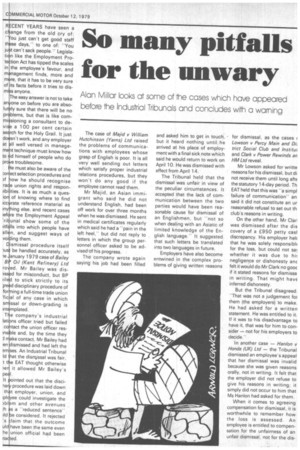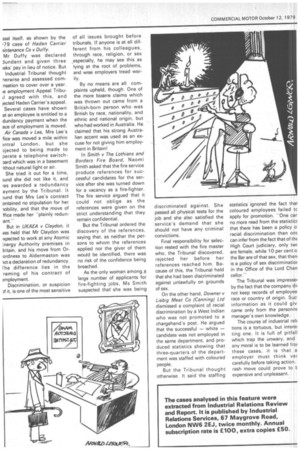So many pitfalls for the unwary
Page 51

Page 52

If you've noticed an error in this article please click here to report it so we can fix it.
Alan Millar looks at some of the cases which have appeared before ne Industrial Tribunals and concludes wh a warning
R CENT YEARS have seen a c ange from the old cry of: ou just can't get good staff t se days,'" to one of: "You jut can't sack people.' Legislatim like the Employment Prate tion Act has tipped the scales in the employee's favour, and m nagement finds, more and mire, that it has to be very sure of its facts before it tries to dis mi s anyone.
The easy answer is not to take an one on before you are absolut ly sure that there will be no pr blems, but that is like corn sioning a consultant to de vi a 100 per cent certain se rch for the Holy Grail. It just do sn't work, and any employer at 11 well versed in manageme t technique must know how to id himself of people who do pr e troublesome.
e must also be aware of the or ect selection procedures and )f ow he should recognise fa e union rights and respon;ibi ities. It is as much a quesio of knowing where to find icc rate reference material as iny hing else, and recent cases )ef re the Employment Appeal "ri i unal show some of the litf Ils into which people have 311 n, and suggest ways of voising them.
Ismissal procedure itself ius be handled accurately, as anuary 1979 case of Bailey B Oil (Kent Refinery) Ltd ro ed. Mr Bailey was disiiss d for misconduct, but BP to stick strictly to its re d disciplinary procedure of for ing a full-time trade union 'fie al of any case in which
s ssal or down-grading is int mplated.
T e company's industrial lati ns officer tried but failed co tact the union officer resins sle and, by the time they ake contact, Mr Bailey had en dismissed and had left the am ses. An Industrial Tribunal Id hat the disalissal was fair, t t e EAT thought otherwise le it allowed Mr Bailey's pe I
It 'mointed out that the discila procedure was laid down th t employer, union, and iplayee could investigate the )bl m and other avenues s a -reduced sentencerid e considered. It rejected .laim that the outcome Uldhave been the same even he union official had been ita The case of Majid v William Hutchinson (Yarns) Ltd raised the problems of communications with employees whose. grasp of English is poor. It is all very well sending out letters which satisfy proper industrial relations procedures, but they won't do any good if the employee cannot read them.
Mr Majid, an Asian immigrant who said he did not understand English, had been off work for over three months when he was dismissed. He sent in medical certificates regularly which said he had a -pain in the left heel," but did not reply to letters in which the group personnel officer asked to be advised of his progress.
The company wrote again saying his job had been filled and asked him to get in touch, • but it heard nothing until he arrived at his place of employment with a final sick note which said he would return to work on April 10. He was dismissed with effect from April 14.
The Tribunal held that the dismissal was unfair in view of the peculiar circumstances. It accepted that the lack of communication between the two parties would have been reasonable cause for dismissal of an Englishmen, but "not so when dealing with an Asiatic of limited knowledge of the English language."' It suggested that such letters be translated into two languages in future.
Employers have also become entwined in the complex problems of giving written reasons
for dismissal, as the cases E Lawson v Percy Main and Di: trict Social Club and Institui and Clark v Power Rewinds an HM Ltd reveal.
Mr Lowson asked for writte reasons for his dismissal, but di not receive them until long aft€ the statutory 14-day period. Th EAT held that this was simpl failure of communication" an said it did not constitute an ur reasonable refusal to set out th club's reasons in writing.
On the other hand, Mr Clanl was dismissed after the dis covery of a £950 petty casl discrepancy. His employer helt that he was solely responsiblE for the loss, but could not saii whether it was due to hn negligence or dishonesty an felt it would do Mr Clark no gooc if it stated reasons for dismissa in writing. That might havE inferred dishonesty.
But the Tribunal disagreed. -That was not a judgement for them (the employers) to make. He had asked for a written statement. He was entitled to it. If it was to his disadvantage to have it, that was for him to consider — not for his employers to decide.
In another case — Hanlon v Honda (UK) Ltd — the Tribunal dismissed an employee's appeal that her dismissal was invalid because she was given reasons orally, not in writing. It felt that the employer did not refuse to give his reasons in writing; it simply did not occur to him that Ms Hanlon had asked for them.
When it comes to agreeing compensation for dismissal, it is worthwhile to remember how the loss is assessed. An employee is entitled to compensation for the unfairness of an unfair dismissal, not for the dis ;sal itself, as shown by the 179 case of Haden Carrier lintenance Co v Duffy.
Mr Duffy was declared Jundant and given three ieks" pay in lieu of notice. But Industrial Tribunal thought rierwise and assessed cornnsation to cover over a year. le employment Appeal Tribu11 agreed with this, and lected Haden Carrier's appeal. Several cases have shown at an employee is entitled to a dundancy payment when the ace of employment is moved. Air Canada v Lee, Mrs Lee's fice was moved a mile within mtral London, but she jected to being made to aerate a telephone switchaard which was in a basement ithout natural light or air.
She tried it out for a time, )und she did not like it, and ,as awarded a redundancy ayment by the Tribunal. It )und that Mrs Lee's contract ontained no stipulation for her -lobility, and that the move of ffice made her "'plainly redunant."
But in UKAEA v Claydon, it as held that Mr Claydon was !xpected to work at any Atomic :nergy Authority premises in lritain, and his move from Orordness to Aldermaston was iota declaration of redundancy. fhe difference lies in the raming of his contract of ?.mployrnent.
Discrimination, or suspicion )f it, is one of the most sensitive
of all issues brought before tribunals. If anyone is at all different from his colleagues, through race, religion, or sex .especially, he may see this as lying at the root of problems, and wise employers tread warily.
By no means are all complaints upheld, though. One of the more bizarre claims which was thrown out came from a British-born person who was British by race, nationality, and ethnic and national origin, but who had worked in Australia. He claimed that his strong Australian accent was used as an excuse for not giving him employment in Britain!
In Smith v The Lothians and Borders Fire Board, Naomi Smith asked that the fire service produce references for successful candidates for the service after she was turned down for a vacancy as a fire-fighter. The fire service argued that it could not oblige as the references were given on the strict understanding that they remain confidential.
But the Tribunal ordered the discovery of the references, saying that, as neither the persons to whom the references applied nor the giver of them would be identified, there was no risk of the confidence being breached.
As the only woman among a large number of applicants for fire-fighting jobs, Ms Smith suspected that she was being discriminated against. She passed all physical tests for the job and she also satisfied the service's demand that she should not have any criminal convictions.
Final responsibility for selection rested with the fire master who, the Tribunal discovered, rejected her before her references reached him. Because of this, the Tribunal held that she had been discriminated against unlawfully on grounds of sex.
On the other hand, Downer v Liebig Meat Co (Canning) Ltd dismissed a complaint of racial discrimination by a West Indian who was not promoted to a chargehand's post. He argued that the successful — white — candidate was not employed in the same department, and produced statistics showing that three-quarters of the department was staffed with coloured people.
But the Tribunal thought otherwise. It said the staffing statistics ignored the fact thai coloured employees failed tc apply for promotion. "One car no more read from the statistics
that there has been a policy o.
racial discrimination than onE can infer from the fact that of thE High Court judiciary, only twE are female, while 10 per cent o the Bar are of that sex, that then is a policy of sex discriminatior in the Office of the Lord Chan cellor " The Tribunal was impressei by the fact that the company dii not keep records of employee race or country of origin. Suc' information as it could giv came only from the personnE manager's own knowledge.
The course of industrial relE tions is a tortuous, but intere! ting one. It is full of pitfall which trap the unwary, and any moral is to be learned fror these cases, it is that a employer must think ver carefully before taking action. rash move could prove to expensive and unpleasant.
























































































































